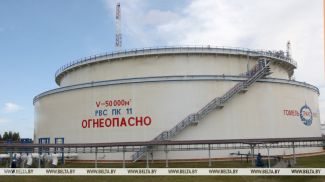MINSK, 10 February (BelTA) - Belarusian cities are making a wide use of the methodological guide developed as part of Green Cities, a project of the GEF, UNDP and the Belarus' Ministry of Environment, in the preparation of the Plan of Action on Sustainable Energy Development and Climate. Implementing such plans by cities is an important part of the Paris Agreement efforts, UNDP Project Coordinator for Communications Ruslan Khilkevich told BelTA.
The Green Cities project is primarily intended to help Belarusian small and medium-sized cities with strategic plans to reduce greenhouse gas emissions and transition to low-carbon development.
The Sustainable Energy and Climate Action Plan (SECAP) is a document developed by the city authorities to be followed by all city agencies to reduce greenhouse gas emissions. SECAP is implemented in close partnership between the local authorities, economic entities and local communities. Of the city
The purpose of the methodological guide developed as part of the Green Cities project is to help city administrations fill out sections of the SECAP template. This template has also been developed by project experts to help city authorities with preparing SECAPs, to automate the calculation of the necessary indicators, to estimate required capital expenditures in infrastructure and identify priority projects to reduce greenhouse gas emissions. The document is a step-by-step instruction for this template. By now, 30 Belarusian municipalities have already used the template and methodological guideline, which shows that the tool is in demand,” Ruslan Khilkevich explained.
In 2015, about 200 countries adopted the Paris Agreement, a document calling on the international community to participate in the fight against climate change. To do this, it is necessary to prevent the global average temperature increase by more than 2 degrees by reducing greenhouse gas emissions. Currently, 168 countries, including Belarus, have ratified the Paris Agreement.
A total of 53 Belarusian cities have joined the European Commission's Covenant of Mayors on Climate and Energy initiative, which involve local governments in ensuring energy and environmental sustainability. City administrations are committed to reducing their CO2 emissions by at least 30% by 2030. The action plan includes measures in the areas of sustainable mobility, land use, building modernization, the implementation of renewable energy sources, the promotion of public green procurement and energy-efficient behavior by city residents.
The project Supporting Green Urban Development in Small and Medium-Sized Cities of Belarus (Green Cities) is funded by the Global Environment Facility and implemented by the United Nations Development Program in partnership with the Ministry of Natural Resources and Environmental Protection of the Republic of Belarus.












